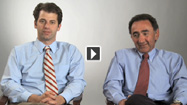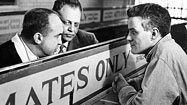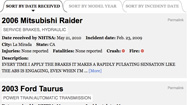Teacher Responses
The following is a list of teacher responses to their "value-added" ratings. In Aug. 2010, teachers were also invited to comment on their 2009 ratings.
The Times gave LAUSD elementary school teachers rated in this database the opportunity to preview their value-added evaluations and publicly respond. Some issues raised by teachers may be addressed in the FAQ. Teachers who have not commented may do so by contacting The Times.
|
|
 Delicious
Delicious
|
 Digg
Digg
|
 Facebook
Facebook
|
 Twitter
Twitter
|





I fully support teacher accountability, but by simply presenting only one measure of effectiveness, this system is presenting an incomplete assessment of a teacher. In addition to test scores, why not publish comments from parents, students, and administrators? These graphs do not represent the social and emotional gains that students have made, nor do they show the service learning, art, and music projects in which students participate. Finally, the numbers that are printed do not even reflect the students I actually taught. We divide our kids into math groups, so I did not teach my own (homeroom) students math. If this information is going to be printed publicly for parents, colleagues, and future employers to see, it should at least be accurate.
April 15, 2011 at 8:34 a.m.
I have been a teacher for about 15 years and I have devoted my career to educating children in one of the most underprivileged neighborhoods in Los Angeles. I love teaching and working with my students. Therefore I was saddened when the LA TIMES began to post “grades” for teachers based on test scores that cannot possibly begin to measure the intelligence and potential of my students, or for that matter my dedication to being a good teacher.
I’ve seen the disheartening effect of your scoring system on excellent teachers that I have had the privilege of working alongside with for more than a decade. One teacher in particular comes to mind. He's the type of teacher who is first in and works through recess and lunch. A good teacher who was made to feel that his efforts as an educator were meaningless based only on test scores. "What more can I do," he asked as he reviewed the ratings himself, trying to figure out what led to his poor showing.
I am dismayed that the Los Angeles Times has chosen to target teachers – one of the most undervalued, under appreciated, and underpaid group of professionals in the country. How can we defend ourselves without seeming defensive. How can we stand up for our children without seeming overly sentimental. We are professionals who must help children deal with societal issues – poverty, domestic violence, abuse, drug use, gang violence--in a classroom that barely has the basics, and then guide them as they learn to read, write, and do mathematics. My goal is to teach my students to be thinkers, life-long learners, and leaders and not simply good test takers. What is your goal?
Is this a ploy to sell papers, to dismantle the union, or rattle the LAUSD?
By making teachers a scapegoat you are not serving the students, but simply promoting an agenda.
April 14, 2011 at 8:27 p.m.
I am extremely cognizant of state testing, but I highly value creativity, the ability to work well with others, scientific thinking, and effective writing on a daily basis in my classroom even more. As such, the measure of my worth as a teacher is limited using only this data. Traditionally, about two thirds of my incoming students earn a perfect score on their third grade math CST. Even if I were to be able to sustain their perfect score with the increasingly difficult fourth grade math concepts and practically doubled class size, I could only be an ineffective teacher by this rating scale for these students. Without an actual increase in CST scores, the results are poor; no credit is given for maintaining a perfect score. This, and other inadequacies, should be addressed in the evaluation process. However, I do help my students become independent thinkers able to prove with evidence. They become increasingly well-rounded in reading, writing, math, history and science. They learn to become conscientious students in charge of their own progress at school. Our learning, and my capability as a teacher, is much more than what is revealed by this data. I am proud of what we accomplish every day.
April 14, 2011 at 2:59 p.m.
I don't like reading of my self as "Fluharty". I am "Ms." Fluharty, not "Fluharty". I am only "Fluharty" to the closest of my friends, and I do not rate the Times as one of those friends.
I do not care that you have changed this slightly, it is still not reflective of everything I do and deal with. I have successes and failures, and yet now I shall be judged only on this isolated bit of data.
Thank-you.
April 14, 2011 at 2:53 p.m.
As a dedicated educator holding positions in and out of the classroom for fifteen years at LAUSD, I believe that these results do not reflect my accomplishments as a teaching professional.
Not only is this LA Times assessment based on just one class’ data (my first and only year teaching this grade level), but much relevant information, such as historical trend analysis seem to be missing.
Ultimately, most teachers welcome feedback that is constructive and can be used as a tool for improvement. However, it appears the LA Times’ methodologies fall short of this goal, and using just one year’s worth of testing results to summarize a 15 year career isn’t just an unfair generalization, but one undoubtedly full of compounding variables.
Nevertheless, I still agree that it is important to hold teachers accountable, but trying to over-simplify a complex issue causes more harm than good. Even the LA Times admits that “For teachers with relatively few students, the ratings have less certainty.” Yet, the LA Times feels justified to use one year of data - a tiny sampling of students and a sample full of “less certainty” according to the LA Times - to summarize a 15 year career? That’s simply poor statistics.
In summary, I am confident that current and former students, their parents, colleagues, and administrators would agree that this information is not representative of my teaching career.
April 14, 2011 at 10:20 a.m.
Unfortunately, test scores are the only thing that the public has at hand. I personally feel that so many important factors cannot be measured by these test results. First, this "graphic" only shows two years of test results vs. my actual teaching history. It does not reflect the high rigor that is evident in my planning and delivery. Nor does it represent these students as being Dual Language students. These third grade classes both received 48% of English instruction throughout their instructional day because that is what the program entails while the majority of their instructional time is spent learning standards-based content in Spanish. By the way, 71% of these English Learners scored at either Advanced or Proficient levels in Spanish Language Arts and 75% in Math in the Standards Test in Spanish in 2009. In 2010 as well, 56% were Advanced or Proficient in Spanish Language Arts and 68% at Proficient and Advanced in Math. Both years, I have had only 4% of my students at Below Basic or Far Below Basic. So, is it my teaching or is it an unfair testing tool (in a second language) and the Language Arts Program that is LEAST EFFECTIVE??? Both years, my students did very well when the standardized test was in their native language and as experts know, it takes at least five years for a child to learn a second language at a proficient level. As Dual Language research also proves, in a few years these same students will outperform their English counterparts. Furthermore, other crucial factors like a child's home support, maturity level, their physical and emotional well-being, learning styles, and individual stories play a huge factor in their academic success. Finally, my students (and all Dual Language students districtwide)) test for three consecutive weeks. They spend one week testing in Spanish and right after that, they test for two more weeks for the CST. It is exhausting!
April 13, 2011 at 11:29 p.m.
No Mama Grizzly Protecting Us!
It is disheartening that some people who should know better, such as Superintendent Cortines and Education Secretary Arne Duncan, did not publicly condemn the Los Angeles Times for releasing teachers' value added scores via the internet. Now every looky-loo with too much time on their hands can peruse what should be confidential personnnel information. Mr. Duncan actually came out in support of releasing the scores, and peppered the media with flippant remarks like "What is there to hide?" . Thus he never directly addressed teachers' legitimate concerns.
Since my ranking is based on how I did compared to other teachers it GUARANTEES that forty percent (20% less effective and 20% least effective) of my fellow teachers will be cast in a negative light. One would hope that one's employer would take offense at allowing forty percent of his/her employees (teachers in this case) to be publicly labeled less or least effective on any part of their job performance.
In my opinion value added scores do have a place in helping me improve my job performance, but they should be kept private and not included as part my formal evaluations.
April 13, 2011 at 10:52 p.m.
I am concerned that there wasn't enough data collected for accurate results. I should have data from 03/04, and o7/08. In addition, I job shared in 08/09 and only taught math. I am uncertain if the data from that year was split in half. It would also be nice to see the list of students included because 41 students seems to be a little low for two years worth of test scores. In the end, I really can't comment on my score because I feel that it is inaccurate.
April 13, 2011 at 9:18 p.m.
Parts make a whole. A well rounded education develops the whole child. Focusing only on English and Math instruction the entire day does not provide for an encompassing well rounded curriculum. What parts are missing? Subjects such as History, Art, Music, Science, Physical Education, Drama, Geography, and Technology. By teaching those subjects I am filling in the missing necessary parts of a child's knowledge.
How can one ascertain teacher effectiveness based on testing two subjects out of many others a child has learned in my classroom?
I address and nurture the social and emotional, as well as the intellectual, aspects of a child. We need all three of those parts. How can the social and emotional growth of children in my classroom be measured? Paper and pencil testing does not determine that.
I teach and encourage a child to think out of the box, not how to fill in a circle with a pencil. By providing a well rounded education my students have the knowledge and life skills they need to grow and succeed.
April 13, 2011 at 7:22 p.m.
I do not give you permission to print my name or any of my information in the newspaper, online, or any other place. Your judgment of my effectiveness is inaccurate, slanderous, and libelous. You are basing your opinion on faulty data. The CST is a biased assessment. Your "methodology" is faulty. You fail to consider the true facts. Your data does not consider the fact that students at my school are tracked by their ability. This greatly affects the performance of the class as a whole. You also fail to consider the personal factors that influence student performance. Personal experiences greatly influence student performance. I could continue with additional reasons (like parent influence, inadequate/unhealthy diet, school safety, etc.), but I know my union has already presented their position. I merely wish to let you know that if my name or information is published, I will hold you (the newspaper, owner, editor, and writers) financially responsible for all damages caused by your publication of this biased attack on me. If you need help in researching the above mentioned points, I would be glad to steer you in the right direction. Again, I do not give you permission to print this or anything else connected to my name.
April 13, 2011 at 7:06 p.m.